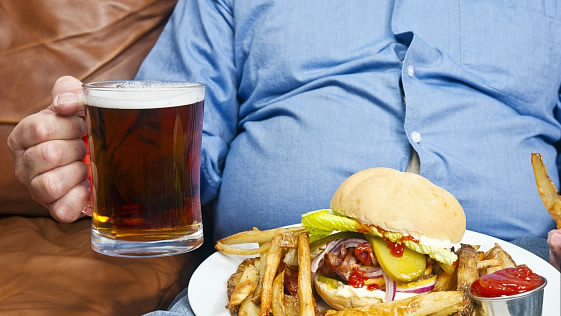


CGTN photo
Scientists have found a switch-like mechanism for burning fat after a meal, according to a study released on Tuesday that offered a potential novel target for the treatment of obesity.
Researchers at Monash University in Australia looked at a process known as browning, during which the body converts white fat, which stores energy, into brown fat, that is used to burn it.
Fat in the human body is stored in specialized cells called adipocytes, which can change from white to brown states and back again.
Their study, published in the US journal Cell Metabolism, showed that a rise in blood glucose after a meal will cause the brain to send signals to promote the browning of fat so that the body will expend energy.
By contrast, after a fast, the brain instructs these browned adipocytes to once more convert into white adipocytes to stored energy.
The complex process is controlled by a switch-like mechanism that turns on after fasting and turns off after feeding to help prevent both excess weight gain and excess weight loss.
"What happens in the context of obesity is that the switch stays on all the time – it doesn't turn on off during feeding," lead researcher Professor Tony Tiganis from Monash University's Biomedicine Discovery Institute said in a statement.
"As a consequence, browning is turned off all the time and energy expenditure is decreased all the time, so when you eat, you don't see a commensurate increase in energy expenditure – and that promotes weight gain," Tiganis said.
The researchers are now exploring the possibility of inhibiting the switch for therapeutic purposes to promote the burning of excess fat.
"What our studies have shown is that there is a fundamental mechanism at play that normally ensures that energy expenditure is matched with energy intake," Tiganis said.
"When this is defective, you put on more weight. Potentially we may be able to rewire this mechanism to promote energy expenditure and weight loss in obese individuals. But any potential therapy is a long way off," he said.
 Fire brigade in Shanghai holds group wedding
Fire brigade in Shanghai holds group wedding Tourists enjoy ice sculptures in Datan Town, north China
Tourists enjoy ice sculptures in Datan Town, north China Sunset scenery of Dayan Pagoda in Xi'an
Sunset scenery of Dayan Pagoda in Xi'an Tourists have fun at scenic spot in Nanlong Town, NW China
Tourists have fun at scenic spot in Nanlong Town, NW China Harbin attracts tourists by making best use of ice in winter
Harbin attracts tourists by making best use of ice in winter In pics: FIS Alpine Ski Women's World Cup Slalom
In pics: FIS Alpine Ski Women's World Cup Slalom Black-necked cranes rest at reservoir in Lhunzhub County, Lhasa
Black-necked cranes rest at reservoir in Lhunzhub County, Lhasa China's FAST telescope will be available to foreign scientists in April
China's FAST telescope will be available to foreign scientists in April "She power" plays indispensable role in poverty alleviation
"She power" plays indispensable role in poverty alleviation Top 10 world news events of People's Daily in 2020
Top 10 world news events of People's Daily in 2020 Top 10 China news events of People's Daily in 2020
Top 10 China news events of People's Daily in 2020 Top 10 media buzzwords of 2020
Top 10 media buzzwords of 2020 Year-ender:10 major tourism stories of 2020
Year-ender:10 major tourism stories of 2020 No interference in Venezuelan issues
No interference in Venezuelan issues
 Biz prepares for trade spat
Biz prepares for trade spat
 Broadcasting Continent
Broadcasting Continent Australia wins Chinese CEOs as US loses
Australia wins Chinese CEOs as US loses